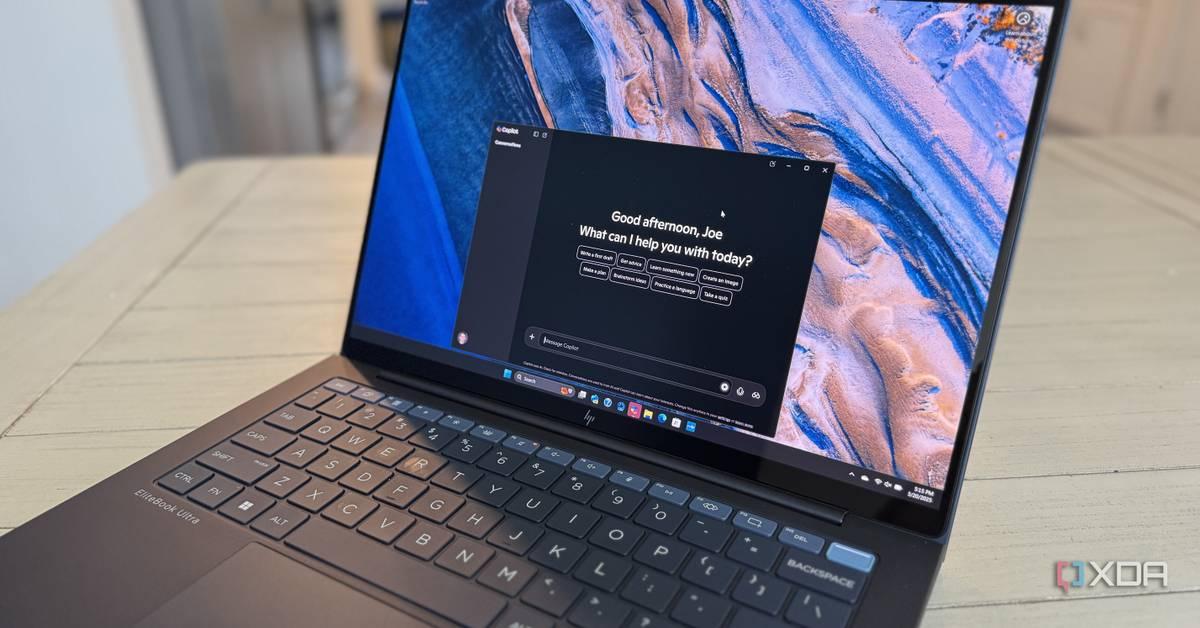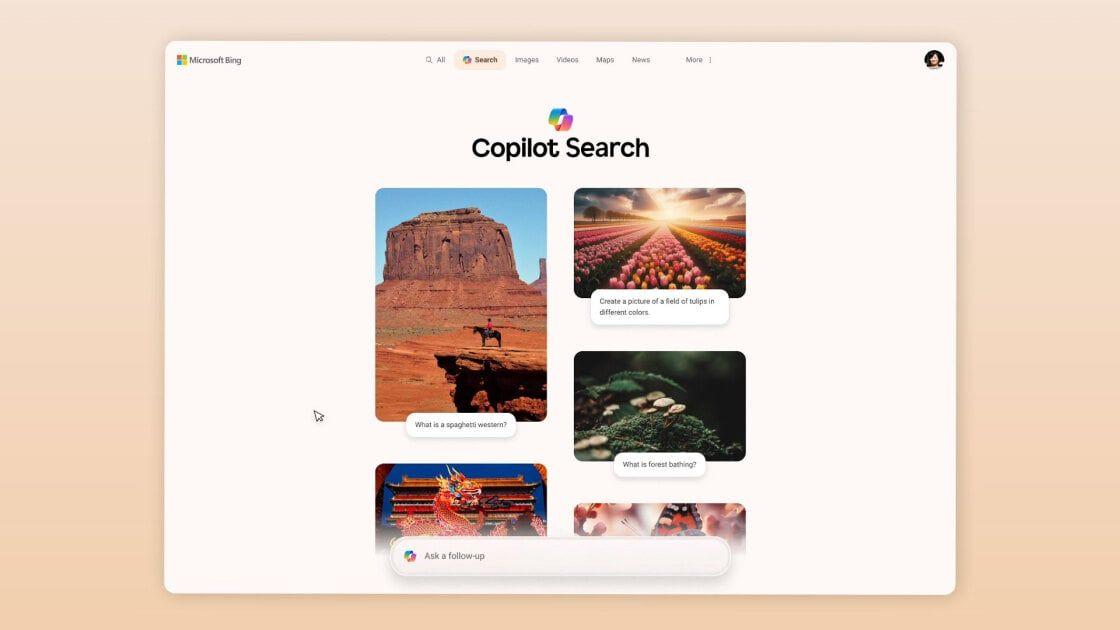Microsoft's Controversial Tactics: Promoting Copilot Over Rival AI Services in Bing Search Results
3 Sources
3 Sources
[1]
Microsoft's tactics to promote Copilot over competitor AI models is somehow irritating - Softonic
Microsoft is using Bing to push its AI, Copilot, over competitors like ChatGPT and Gemini, raising ethical concerns about fair competition in search engine results. Microsoft is once again leveraging its control over Bing to push its own AI product, Copilot, instead of allowing fair competition. This strategy is reminiscent of its past efforts to discourage users from downloading rival browsers like Google Chrome. Now, the tech giant is applying similar tactics to steer users away from AI services like ChatGPT, Gemini, and Grok. According to reports, when users search for these AI chatbots on Bing, the expected result does not appear first. Instead, Microsoft inserts a prominent box encouraging users to try Copilot, its proprietary AI assistant. This move is seen by many as an aggressive way to retain users within Microsoft's ecosystem, which has struggled to dominate the AI space despite significant investment. This approach raises ethical concerns, as Microsoft is using its search engine's dominance to prioritize its own products over fair competition. While promoting in-house services is not illegal, critics argue that it gives Microsoft an unfair advantage. This is particularly relevant considering that Bing is still a secondary choice for many users compared to Google, and such aggressive marketing tactics may push users further away. Beyond AI, Microsoft has employed similar strategies with its Edge browser. When users search for Chrome, Bing often presents prompts urging them to stay with Edge, making it clear that Microsoft is intent on keeping users within its own ecosystem. The debate over whether this practice is ethical or merely a smart business move continues. However, users are increasingly irritated by these obstacles when trying to access competing services, making Microsoft's strategy a controversial topic in the AI and tech industry.
[2]
Someone caught Microsoft Bing hijacking searches for competing AI services to add a Copilot widget
Summary Microsoft Bing promotes Copilot over rival services in search results. Microsoft's default products often direct users to Bing, increasing traffic to the search engine. Microsoft has a history of promoting its products over competitors on Bing, indicating a continuation of this strategy. Microsoft hasn't been on its best behavior with its search engine, Bing. Recently, the company has attempted some pretty sneaky tricks to get people to use its services over its competitors. Its main method of attack is to identify when you search for a rival product, then slip in something that promotes Microsoft's products instead. We had hoped that the company would stop this practice, but if a recent report were to be believed, the Redmond giant has returned to its old tricks by encouraging people to use Copilot. Related Logitech G515 Lightspeed TKL review: A premium-feeling gaming keyboard The Logitech G515 Lightspeed TKL is affordable, feels excellent when typing, and is one of the most comfortable gaming keyboards I've used Posts Microsoft Bing begins serving a Copilot widget at the top of search results for rivals In a report by Neowin, weird things are happening if you dare search for one of Copilot's rival services using Bing. Instead of showing you the results at the top, Microsoft will show you a big, unmissable "Copilot" box. You can then enter your prompt into this box and have it answer your questions instead of whatever service you wanted in the first place. Microsoft's trick is a little more nefarious than you may first think. A lot of its products, by default, open Bing when the user wants to search something. If you want to find something on the web via the Windows Search bar, it'll end up opening Bing. If you're using a public PC, you're likely stuck with using Microsoft Edge...which uses Bing as its default search engine. As such, there's a lot of captive traffic going through Bing, which means that Microsoft can do some pretty sneaky tricks to encourage people to use its products over its competitors. Microsoft Bing has a pretty crafty history As we said earlier, this isn't the first time we've seen Microsoft do this with Bing. It wasn't that long ago that we saw Microsoft Bing make its best Google impression when people searched for Alphabet's famous search engine. It even came with its own convincing Google Doodle and everything. Microsoft did eventually take down this little trick, and we had hoped that it meant that it was done trying to push its own products when people search for a competitor's products. However, with this new trick, it seems that we're not going to see the last of this particular strategy for a while.
[3]
Microsoft tries another ugly trick to attract users, this time for Copilot
If you search for AI chatbots in Bing, you might see this desperate attempt to get you using Copilot instead. It appears Microsoft is once again playing dirty tricks to attract users to their own services. Earlier this year, they tried disguising Bing as Google to trick searchers, and now Neowin reports that they're running a similar ploy for its Copilot AI chatbot assistant. According to Neowin, if you search for an AI chatbot in the Bing search engine -- including popular alternatives like ChatGPT and Gemini -- you'll see a special box with Microsoft's own Copilot AI above the search results you're expecting. If you actually submit a message in the box, then Copilot fully opens in a new tab. We gave it a try and were able to replicate it. Typing "chatgpt" into Bing gave us a special Copilot element in the search results, labeled as "Your AI companion" with a field to "Message Copilot." It's possible that Microsoft is only running this trick in certain regions (possibly only in the US?) and/or for a limited number of users. If you don't see it yourself, consider yourself lucky! For now...
Share
Share
Copy Link
Microsoft is using its search engine Bing to aggressively promote its AI assistant Copilot, raising concerns about fair competition and user experience in the AI industry.

Microsoft's Aggressive Promotion of Copilot
Microsoft has once again come under scrutiny for its aggressive marketing tactics, this time for promoting its AI assistant Copilot at the expense of rival services. Recent reports indicate that when users search for competing AI chatbots like ChatGPT, Gemini, or Grok on Bing, Microsoft's search engine, they are presented with a prominent box encouraging them to try Copilot instead
1
.The Controversial Search Results Manipulation
When users search for AI chatbots on Bing, instead of displaying the expected results first, Microsoft inserts a conspicuous "Copilot" box at the top of the search results. This box, labeled as "Your AI companion," includes a field inviting users to "Message Copilot"
3
. If a user interacts with this box by submitting a message, Copilot fully opens in a new tab, effectively redirecting them from their original search intent2
.Ethical Concerns and Fair Competition
This strategy has raised significant ethical concerns regarding fair competition in the AI industry. Critics argue that Microsoft is leveraging its control over Bing to give Copilot an unfair advantage over competitors. While promoting in-house services is not illegal, the manner in which Microsoft is doing so is seen by many as an aggressive attempt to retain users within its ecosystem
1
.Microsoft's History of Similar Tactics
This is not the first time Microsoft has employed such tactics. Earlier this year, the company attempted to disguise Bing as Google to attract searchers. Similarly, when users search for web browsers like Google Chrome, Bing often presents prompts urging them to stay with Microsoft Edge
1
3
.Related Stories
Implications for User Experience and Market Dynamics
Microsoft's strategy is particularly noteworthy given Bing's position as a secondary choice for many users compared to Google. The company's default products often direct users to Bing, increasing traffic to the search engine. This captive traffic allows Microsoft to implement these promotional tactics, potentially at the cost of user experience
2
.Industry and User Reactions
The tech industry and users alike have expressed irritation at these obstacles when trying to access competing services. The debate continues over whether this practice is an ethical business strategy or an unfair manipulation of search results. As AI becomes increasingly integral to online services, the controversy surrounding Microsoft's tactics highlights the growing competition and the lengths to which tech giants may go to secure their position in the AI market
1
3
.References
Summarized by
Navi
[1]
[2]
Related Stories
Recent Highlights
1
Google Gemini 3.1 Pro doubles reasoning score, beats rivals in key AI benchmarks
Technology

2
Meta strikes up to $100 billion AI chips deal with AMD, could acquire 10% stake in chipmaker
Technology

3
Pentagon threatens Anthropic with supply chain risk label over AI safeguards for military use
Policy and Regulation








